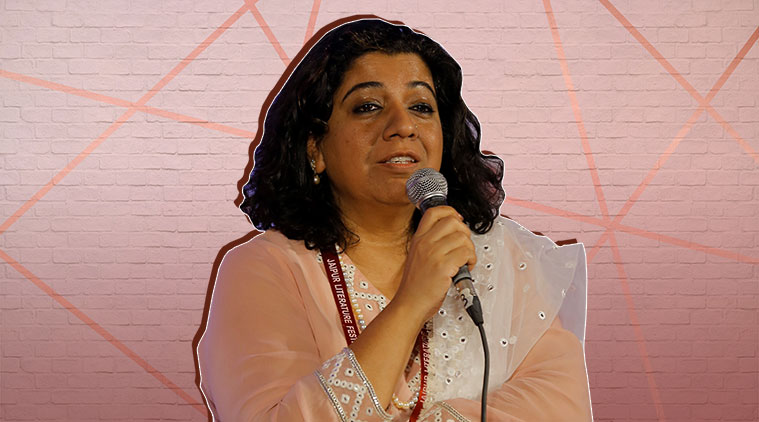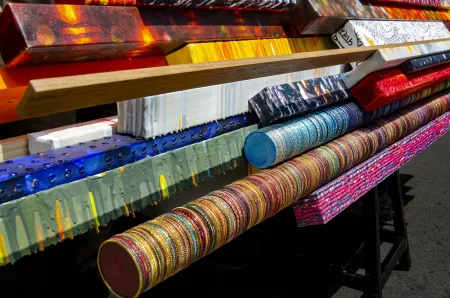- India
- International
Food is my immigrant story and Darjeeling Express my love letter to Kolkata: Asma Khan
Her journey, from hosting supper parties at home for strangers to doing a pop-up at a pub in Soho, and finally having a restaurant, contributed in making her the first British chef to feature on Netflix’s Chef Table.
 A second child, Khan is also a second daughter. Her birth was marked with disappointment. (Photo designed by Rajan Sharma)
A second child, Khan is also a second daughter. Her birth was marked with disappointment. (Photo designed by Rajan Sharma)
When Asma Khan told her mother she was dying, her mother said it was hunger. At the age of 22, Khan had married the man she had chosen for herself — a gold medallist and professor — and moved to England. Over time, she got a law degree and a PhD. And yet, the foreign land remained stubbornly distant.
She felt an inexplicable emptiness whose origin or cause she could not place. She came close to locating it the day she rode her bicycle a little farther than usual and smelt parantha being prepared in the neighbourhood. She wanted to knock on the door. Instead, she wept. The incapability to recreate the food she had grown up eating crippled her. She came back to India and confided in her mother. The dejection, Khan was told, was disguised hunger she felt for the food she had left behind. To overcome it, she was taught how to cook. The lessons, in hindsight, ended up scripting an unusual but deeply moving success story. Khan’s restaurant, Darjeeling Express — operated by South-Asian women who like her had no experience in cooking before — bustles with patrons at any given time of the day. Bookings ought to be made months in advance.
Her journey, from hosting supper parties at home for strangers to doing a pop-up at a pub in Soho, and finally having a restaurant, contributed in making her the first British chef to feature at Netflix’s Chef Table. In the show, she looks back at her journey and speaks with an authoritative assurance about the initial obstacles (her father and husband were not pleased) as if she could foresee the eventual success all along. She displayed the same certitude at the Jaipur Literature Festival this year when she shared her experiences amid applause and unending questions.
ALSO READ | Jaipur Literature Festival 2020: Here are some sessions to look forward to
‘My nani was devastated when I was born’
“In my story, they find their own story,” the 50-year-old chef says, implying that an assertion of will by women is intrinsically perceived as an act of defiance irrespective of privilege. The degree merely varies. In her case, the act of going back to the kitchen — considered obedience for women — met with silent disapproval because it displayed her choice. “I went to the kitchen because I wanted to. Not because someone asked me to make rotis.”

A second child, Khan is also a second daughter. Her birth was marked with disappointment. She does not it hold back in the show and neither minces words in person. “My nani (maternal grandmother) was devastated when I was born. She had five daughters,” she says, speaking to indianexpress.com on the sidelines of the festival. She vividly remembers how her mother had cried, how sad her father was. “This lamenting at my birth scarred me. But I think it left a fire in me to do something. I wanted to do something to make them proud.” Being a second daughter, she believes, shapes identities. Her constant awareness of the same has translated into a happy accident — all the women working with her are second daughters.
Book signing after my second session on day 1 of the @JaipurLitFest– thank you @NamitaGokhale_ for connecting on Twitter last year and inviting me to JLF Belfast…then JLF Doha and now Jaipur- thank you for your friendship and generosity in including me in the JLF family ❤️ pic.twitter.com/ARDZkxo42h
— Asma Khan (@Asma_KhanLDN) January 23, 2020
Admission of her regret-tinged birth in the show was tough, she discloses. But Khan wanted to use the platform to be the voice for those who are possibly still reminded, however slightly, of being a burden. Expectantly, she was apprehensive about her parents’ reactions. They did not have a Netflix account and an electrician was made to sit with them to ensure the smooth running of the episode. “I had timed my call and asked, ‘Amma, what did you think?’” Her mother’s first words were: “Beta, I am so disappointed. You did not comb your hair. So many people were there and no one thought of combing your hair? They should have put a pin.” She was not done yet. “In that scene when you are walking, the dupatta is touching the kichar (dirt). Why did you drape it like that?” “Ammu, did you see that scene,” Khan had asked, impatient, “Yeah yeah but why didn’t they comb your hair?” The recollection that tenderly underlines how some stories are disappointing and some disappointments become stories ceases to be just an anecdote. It is a reminder of how hard Khan worked to achieve the latter.
ALSO READ | Jaipur Literature Festival 2020: From cultural showcases to panel discussions, things that livened up Day 1
‘Food helped me accept myself’
“When I am presenting my food to you, I am presenting myself,” the chef remarks. Her menu consisting of dum biryani, phuchka, tangra prawn, beetroot chop — soaked in nostalgia — bears evidence. The beetroot chop, which she unabashedly admits is the ubiquitous vegetable chop — “there is no other word for it” — found at every corner of Kolkata streets. The effect it has on the Bengalis who come to eat is visceral — “They eat and weep.” Its impact was not lost even on Sabyasachi Mukherjee. The designer had tasted it and decided to include Khan in the Vogue September issue last year that featured a few women who are part of his inner circle. “He ate the beetroot chop and told me, ‘I am going to edit the Vogue issue and I want you to come.’” She had stayed back at his place and cooked the same for him later.
She and her all-female chefs also serve bhapa doi. Unlike its English translation, it is not baked doi but the famed mishti doi. She steams it a bit to make up for the lack of humidity in London but chooses to call it bhaapa doi to bypass the perennial curiosity of Bengalis. “They will drive me mad asking about the recipes. I tell them it is steamed and they go away. Otherwise they often ask me, “kemon korey baniyecho?” (How did you make it?), she affectionately complains.
My cookbook resting on top of the @JaipurLitFest brochure. So exciting to see my cookbook in a festival which is often described as the greatest literary festival in the world! pic.twitter.com/wHqKXengtL
— Asma Khan (@Asma_KhanLDN) January 23, 2020
Born in Kolkata (her mother is from there and her father from Aligarh), the city left an indelible impact on her, imprinting her the way very few things later in life did. “There is something very powerful about the city and it has left a huge legacy in me. I feel it recognises me in a way England, my home for over three decades, could never do. It made me very proud of my heritage, of being an Indian Muslim.” By re-creating and creating food from the place she holds so close, somewhere Khan found herself again. “Food helped me accept myself and find my way home. It is my immigrant story and Darjeeling Express is my love letter to the city.”
She is not done yet. A champion of women’s rights, she has started a charity that celebrates the birth of second daughters and all female-staff cafes to aid the survivors of ISIS. With every stride, Khan appears to be moving farther from the city she carries in her heart and which roots her like nothing else does. But that is not the case. Kolkata is not just the inspiration but destination for her restaurant. “I want to take Darjeeling Express back to Kolkata, to Sealdah.”
Apr 25: Latest News
- 01
- 02
- 03
- 04
- 05



































